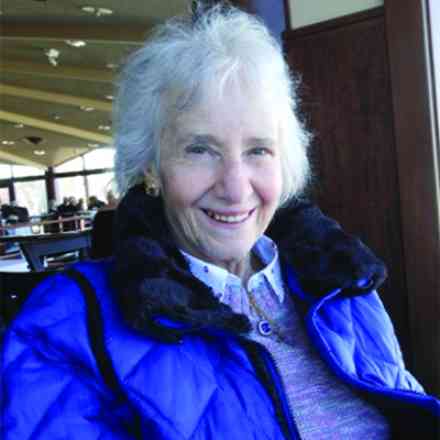The men in her department envied her.
She was too handsome, had published too many poems.
So, she’d tone down:
she wore olive-drab all that autumn
said she was in a dry season
could not write a single poem.
But her cheeks
took on the flush
of a woman riding.
Hand-to-hip she’d
breathe in the air
of evening. The casual woman.
Sayre!
She’d claim she was a lonely woman
and besides had a bad spine. Who’d envy her?
So intense that her fist
would smash glass
a Sunday evening.
But she’d flush a whole nest of quail
out of hiding
without so much as a shotgun (or a sound.)
Camouflaged
broods of poems came.
The poem for her was—love’s occasion.
She’d rise after, with that radiance
of a woman to meet her lover, eye shining
face to face.
Not one of the men guessed it was another woman.
So handsomely she moved, so darkly as through glass.
Editor’s Note: “Sayre (Woman Professor)” is perhaps Strongin’s most well-known and frequently reprinted poem and was called a “classic” in Margaret Cruikshank’s landmark work Lesbian Studies: Present and Future. Originally published in Rising Tides: 20th Century American Women Poets edited by Laura Chester and Sharon Barba (Pocket Books, 1973), “Sayre” has been reprinted in influential anthologies such as I Hear My Sisters Saying: Poems by Twentieth-Century Women edited by Carol Konek and Dorothy Walters (Thomas Y. Crowell Company, 1976) and Lesbian Poetry: An Anthology edited by Elly Bulkin and Joan Larkin (Persephone Press, 1981). The poem has also been referenced in critical works such as Feminisms: An Anthology of Literary Theory and Criticism (Rutgers University Press, 1997) and The Norton Anthology of Theory and Criticism (W. W. Norton & Company, 2010).

